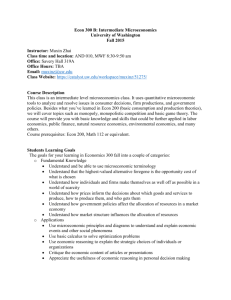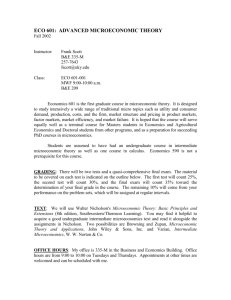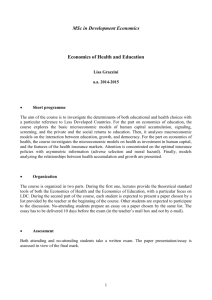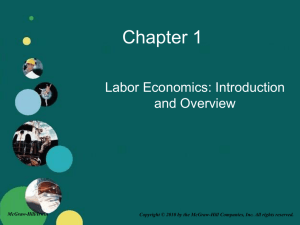SE1619 - ruc international summer school
advertisement
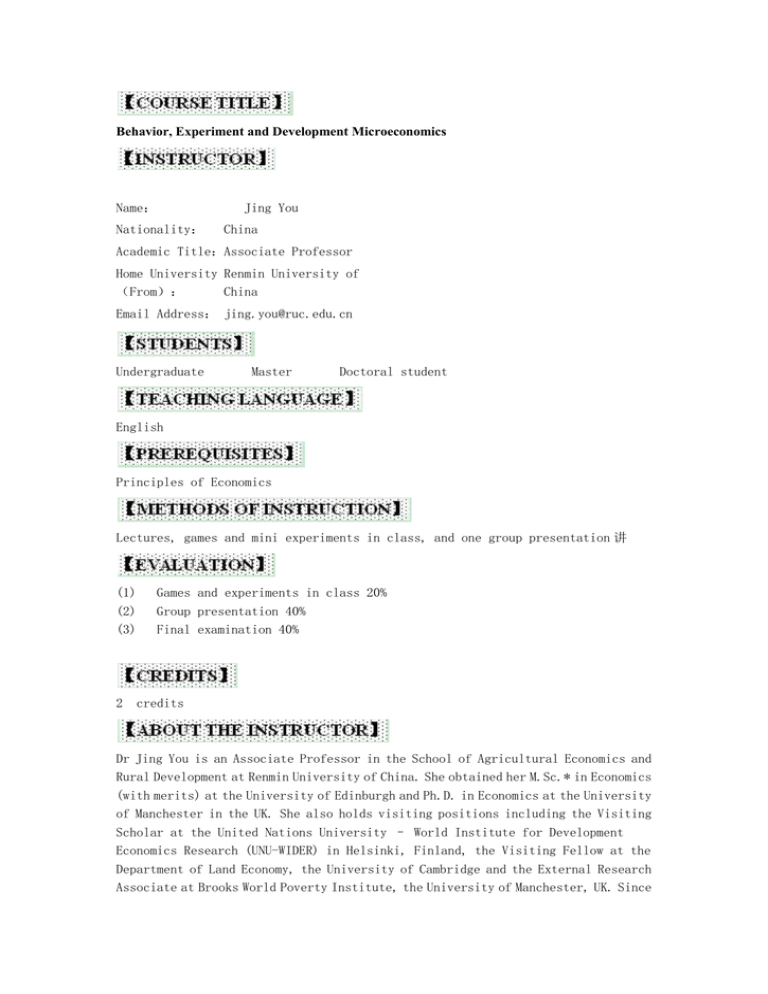
Behavior, Experiment and Development Microeconomics Name: Nationality: Jing You China Academic Title:Associate Professor Home University Renmin University of (From): China Email Address: jing.you@ruc.edu.cn Undergraduate Master Doctoral student English Principles of Economics Lectures, games and mini experiments in class, and one group presentation 讲 (1) (2) (3) Games and experiments in class 20% Group presentation 40% Final examination 40% 2 credits Dr Jing You is an Associate Professor in the School of Agricultural Economics and Rural Development at Renmin University of China. She obtained her M.Sc.* in Economics (with merits) at the University of Edinburgh and Ph.D. in Economics at the University of Manchester in the UK. She also holds visiting positions including the Visiting Scholar at the United Nations University – World Institute for Development Economics Research (UNU-WIDER) in Helsinki, Finland, the Visiting Fellow at the Department of Land Economy, the University of Cambridge and the External Research Associate at Brooks World Poverty Institute, the University of Manchester, UK. Since 2007 she has held memberships of the Royal Economic Society, European Economic Association and the Econometric Society. Her research interests are in the fields of Development Economics, Applied Microeconomics and Microeconometrics, with a particular interest in individual behavioral responses and their consequences for livelihoods. She has presented her research in important international conferences, such as the Royal Economic Society Annual Conference, China Meeting of the Econometric Society, Chinese Economic Association (UK/Europe) Annual Conferences and those held at Oxford University, Peking University and OECD Headquarters (Paris). Since 2012, she has been the principal investigator in 15 research projects such as the National Natural Science Foundation of China and the Humanities, Social Sciences Research Funds of the Ministry of Education of China and projects supported by the British Academy and the UNU-WIDER. She has also published 14 peer-reviewed articles in international leading journals such as World Development, Oxford Bulletin of Economics & Statistics, Health Economics, Agricultural Economics, Journal of Development Studies, China Economic Review, and Food Policy, and published 2 books in the UK and Germany, respectively. This course introduces the theories and interesting empirical findings in the fields of behavioral and experimental economics and their applications in development microeconomics. Students will participate in various games and in-class mini experiments, from which they are expected to have a real taste of ‘strategic behavior’ and its impact on their livelihoods. The main theoretical contents cover utility, well-being, equality, justice, strategic decision making, and neo-classical household model applied in developing countries such as agricultural production process, risk, credit and microfinance. In particular, the course will associate micro incentives and decision making processes to macroeconomic phenomena and utilize theories and empirics in behavioral and experimental economics to unveil problems and issues that cannot be explained by conventional development economists. It exposes students to cutting-edge research methods and progress in development microeconomics. By the end of this course, students are expected achieve the following outcomes: 1)Gain economic intuition and an economic way of ‘strategic thinking’; 2)A good understanding of the theoretical underpinning of poverty, inequality and household microeconomic models and their policy interventions, from the perspectives of individual rationality, preferences and behavioral incentives; 3)Approach frontiers in development microeconomic research and an international horizon; 4)The acquisition of advanced quantitative skills with regards to development microeconomic issues; 5)Some ideas for methodologies to carry out their own research projects. This course introduces the theories and interesting empirical findings in the fields of behavioral and experimental economics and their applications in development microeconomics. Students will participate in various games and in-class mini experiments, from which they are expected to have a real taste of ‘strategic behavior’ and its impact on their livelihoods. The main theoretical contents cover utility, well-being, equality, justice, strategic decision making, and neo-classical household model. The applications include production and livelihood arrangement, decisions in labour and marriage markets, business, behaviour in credit markets with risk, and behaviour in microfinance. In particular, the course will associate micro incentives and decision making processes to macroeconomic phenomena and utilize theories and empirics in behavioral and experimental economics to unveil problems and issues that cannot be explained by conventional development economists. It exposes students to cutting-edge research methods and progress in development microeconomics. By the end of this course, students are expected achieve the following outcomes: 1) Gain economic intuition and an economic way of ‘strategic thinking’; 2) A good understanding of the theoretical underpinning of poverty, inequality and household microeconomic models and their policy interventions, from the perspectives of individual rationality, preferences and behavioral incentives; 3) Approach frontiers in development microeconomic research and an international horizon; 4) The acquisition of advanced quantitative skills with regards to development microeconomic issues; 5) Some ideas for methodologies to carry out their own research projects. [1] Ken Binmore (2007) Game theory: A very short introduction. Oxford University Press. [2] Herbert Gintis (2008) The bounds of reason: Game theory and the unification of the behavioral sciences. Princeton University Press. [3] Nick Wilkinson and Matthias Klaes (2012) An introduction to behavioral economics. Palgrave Macmillan. Lecture notes and journal articles



